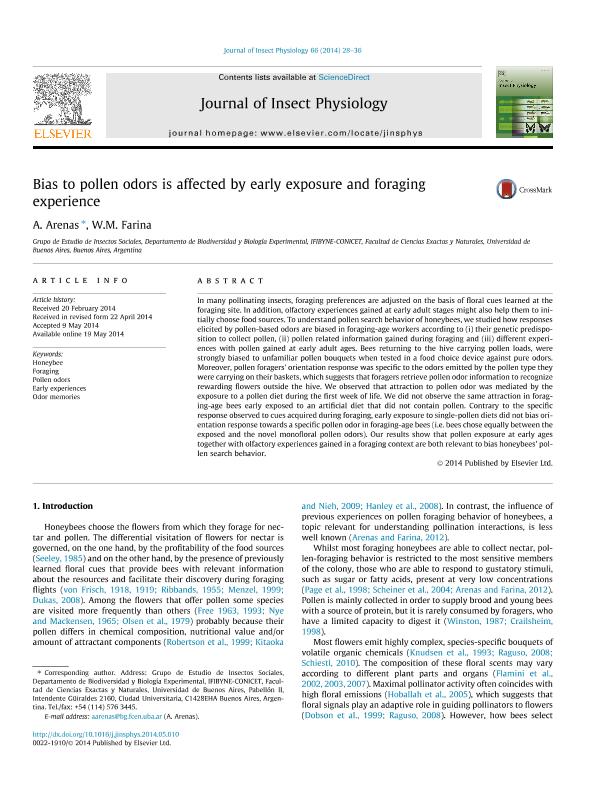Artículo
Bias to pollen odors is affected by early exposure and foraging experience
Fecha de publicación:
05/2014
Editorial:
Elsevier
Revista:
Journal of Insect Physiology
ISSN:
0022-1910
Idioma:
Inglés
Tipo de recurso:
Artículo publicado
Clasificación temática:
Resumen
In many pollinating insects, foraging preferences are adjusted on the basis of floral cues learned at the foraging site. In addition, olfactory experiences gained at early adult stages might also help them to initially choose food sources. To understand pollen search behavior of honeybees, we studied how responses elicited by pollen-based odors are biased in foraging-age workers according to (i) their genetic predisposition to collect pollen, (ii) pollen related information gained during foraging and (iii) different experiences with pollen gained at early adult ages. Bees returning to the hive carrying pollen loads, were strongly biased to unfamiliar pollen bouquets when tested in a food choice device against pure odors. Moreover, pollen foragers’ orientation response was specific to the odors emitted by the pollen type they were carrying on their baskets, which suggests that foragers retrieve pollen odor information to recognize rewarding flowers outside the hive. We observed that attraction to pollen odor was mediated by the exposure to a pollen diet during the first week of life. We did not observe the same attraction in foraging-age bees early exposed to an artificial diet that did not contain pollen. Contrary to the specific response observed to cues acquired during foraging, early exposure to single-pollen diets did not bias orientation response towards a specific pollen odor in foraging-age bees (i.e. bees chose equally between the exposed and the novel monofloral pollen odors). Our results show that pollen exposure at early ages together with olfactory experiences gained in a foraging context are both relevant to bias honeybees’ pollen search behavior.
Palabras clave:
Honeybee Foraging
,
Pollen Odors
,
Early Experiences
,
Odor Memories
Archivos asociados
Licencia
Identificadores
Colecciones
Articulos(IFIBYNE)
Articulos de INST.DE FISIOL., BIOL.MOLECULAR Y NEUROCIENCIAS
Articulos de INST.DE FISIOL., BIOL.MOLECULAR Y NEUROCIENCIAS
Citación
Farina, Walter Marcelo; Arenas, Andres; Bias to pollen odors is affected by early exposure and foraging experience; Elsevier; Journal of Insect Physiology; 66; 5-2014; 28-36
Compartir
Altmétricas




